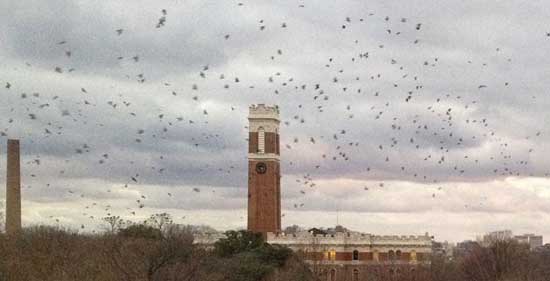
Sounds of fireworks and flashing light will fill the air a couple of times each day beginning Thursday, Feb. 11, as Vanderbilt undertakes its latest effort to drive roosting birds from campus.
Not only are the birds’ droppings a mess, but they also can create health hazards for students, staff and faculty. As a result, the efforts to disperse these animals—complete with noise-making devices and pyrotechnics—will begin Feb. 11 and continue until Feb. 29.
How do you get rid of the birds without harming them? “It’s not easy. We have to disrupt their roosting patterns for a few weeks,” said Mark Petty, assistant vice chancellor for Plant Operations. “From 5:30 to 7 a.m., which is when the birds usually leave their roosts, and from 4:30 to 6 p.m., the time they come back, we will use a variety of noise-making devices in an effort to get them to leave campus.”
In the morning, a strobe light along with a recording of birds in distress will be played to rouse the birds from their nests. “The loudest noises will come in the late afternoon,” Petty said. “That’s when propane percussion cannons—no projectiles—and pyrotechnics will be used.”
Some 15 years ago, Vanderbilt was under siege by more than a half-million birds. That was the first time these dispersal efforts were used. “We don’t have as many birds now as we did several years ago, but we need to make areas of campus more hygienic and hospitable for humans,” Petty said.
The first wave of new complaints about bird droppings came in December from faculty and staff parking near the corner of West End Avenue and 21st Avenue South, Petty said. The latest dispersal operation will concentrate on the north and central campus, including Warren and Moore Colleges, the Baker Building, Vanderbilt Law School, Wilson Hall and the Owen Graduate School of Management. The birds are attracted to the large number of magnolia trees in these areas. The trees keep their leaves and berries throughout the winter, creating an inviting roosting area for crows, starlings and blackbirds.
“It’s important to remember that starlings and other birds native to Tennessee can cause health problems when present in large numbers in roosts,” said Dr. Louise Hanson, medical director of the Student Health Center. “The bird droppings that fall into the soil below the roosts can harbor a fungus that is especially able to multiply in the relatively temperate and moist environment here in Nashville.”
The main health culprit is histoplasmosis, an infection caused by inhaling spores of the fungus. “When the bird droppings below the roost mix with the soil and then turn to dust, people walking in the area can breathe in the particles and potentially become infected with histoplasmosis,” Hanson said. “Most people will clear the infection and not even have symptoms, but some people will have symptoms such as a flu-like illness. The rare patient can even develop widespread histoplasmosis or severe lung disease. These complications usually occur in patients who have significant underlying medical illnesses, such as chronic lung disease or immunosuppression.”
“We will continually clean up areas where there are significant bird droppings to prevent any health hazard,” Petty said.
In addition, the loud noises caused by the dispersal devices may be distressing to some individuals. Dr. Cathy Fuchs, director of the Psychological and Counseling Center, offers advice on dealing with a range of responses to loud noises.
“If you’ve experienced a sudden ‘jumpy’ reaction to a loud sound, a flash of light, a sudden movement, or a friend who yelled ‘surprise!’ then you have likely experienced a startle response,” Fuchs said. “This response is a natural reaction to an event that you were not necessarily prepared to encounter.
“Along with this sudden ‘jumpy’ reaction, you also may experience some shortness of breath and an accelerated heart rate for a few moments. If you find yourself experiencing some of these reactions in response to a loud sound, recognizing that this is a natural response to an event can help you refocus on your breathing, re-familiarize yourself with your environment, and bring your breathing back to a more relaxed rhythm,” she said. The PCC offers self-care resources on their website at https://medschool.vanderbilt.edu/pcc/mind-body-lab.